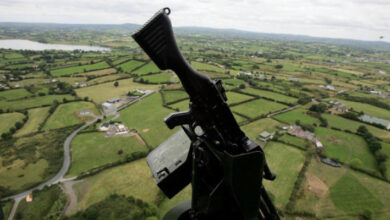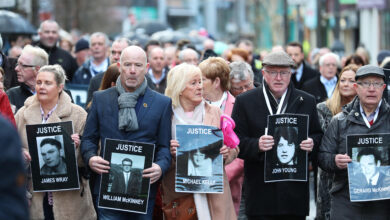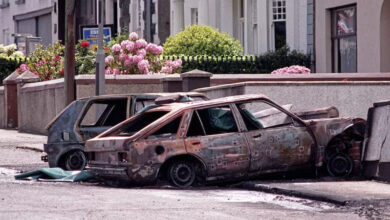‘Agenti di plastica’ presto nelle strade nordirlandesi?
‘Plastic police’ could soon be on Northern Ireland’s streets

Plans to introduce controversial ‘plastic police’ tofficers to tackle petty crime and anti-social behaviour on the streets of Northern Ireland are back on the table, the Belfast Telegraph can reveal.
Former Chief Constable Sir Hugh Orde abandoned plans to recruit Police Community Support Officers (PCSOs) because of funding shortfalls but new Chief Constable Matt Baggott is now keen to see the civilian recruits deployed to provide back-up to regular officers.
The plans, however, have been attacked by the Police Federation as “an attempt to bluff the public”.
PCSOs, which have been dubbed ‘plastic policemen’ by critics, have been used in England and Wales for many years to tackle anti-social behaviour and low- level crime but they do not have the same powers of arrest as regular officers.
Their introduction in the province had been debated several years ago and after being given the go-ahead recruitment was due to begin last year.
However, the plans were dropped under Orde as he tried to plug a multi-million pound budget gap.
Concerns were also previously expressed that the PCSOs could be seen as a soft target during a time of a rising dissident threat.
However, now with a new Chief Constable, who is an advocate of visible neighbourhood policing, the plans are set to be revived.
The vice chairman of the Northern Ireland Policing Board told a policing conference this week he believed there will be a move to a “limited” introduction of PCSOs.
Brian Rea, who travelled to Lancashire with a Policing Board party to see PCSOs on the ground several years ago, said: “I thought they were a very good idea.
“To have people who are not necessarily warranted officers but who are on the ground with some or other limited powers would provide a deterrent, especially for city centre crime.
“Having gone through the motions of preparing for this, the uniforms and number of powers decided on, then because of finances the former Chief Constable drew it to a close, I think it would be the board’s view that now we have a new Chief Constable, the move will be that we will see a limited introduction of PCSOs.”
Assistant Chief Constable Alistair Finlay also told the conference PCSOs would be a “welcome addition” to policing in Northern Ireland.
“They would only be able to do limited things but they could develop relationships with the community,” he said.
“Our priority at the moment is to get our own house in order, to get officers out from behind desks.
“The next step after that could be PCSOs.
“They can contribute to people feeling safe.”
The Northern Ireland Police Federation, however, said “the jury is still out” on the value of PCSOs.
“We think it is an attempt to bluff the public into thinking there is a proper police officer on duty. The public expect fully attested officers but these people have to call in the police,” a spokesman said.
“We also do not think the security situation in Northern Ireland would lend itself to their full deployment.”
Police forces in England and Wales already have around 20,000 PCSOs who have been derided as “artificial policing”, but also hailed as the eyes and ears of police in town centres and on housing estates.
Police say that PCSOs are not replacement police officers but are there to address some of the tasks that do not require the experience or powers held by police officers which often take officers away from more appropriate duties. They have limited powers but can give some fixed penalty notices, take names and addresses in incidents of anti-social behaviour and confiscate alcohol and tobacco.
Background
PCSOs are not police officers.
They are members of support staff employed, directed and managed by their police force.
They work to complement and support regular police officers providing a visible and accessible uniformed presence in communities.
A major part of their work involves tasks that when undertaken by police officers do not require them to use their full police powers.
They are fully trained, supervised by police officers and have radio access to call for assistance if required.




